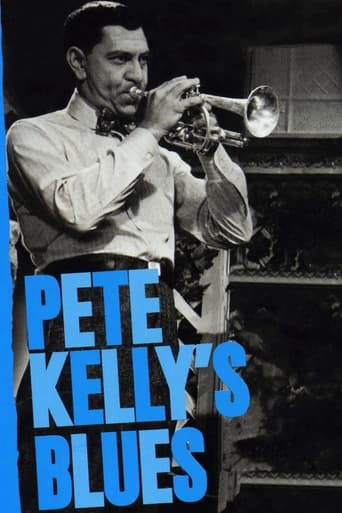JohnHowardReid
Considering all the hype with which the medium was promoted, the early days of CinemaScope brought very few cinema masterpieces. "Pete Kelly's Blues" is one of those few.By masterpiece, I don't just mean superlatively entertaining. "Broken Lance" fills that bill, but it's not the sort of movie you can see over and over again, each time re-living the emotions of the characters and soaking up the atmosphere. The master script has an astringency, the master movie has a pace and flair that survive endless repetition. There is a special poignancy about the acting, a unique vigor in the direction, an artistic harmony in the images, a soul-searching vibrancy in the music. It's a movie with something to say, even if its philosophy can only be expressed in the most general terms, for example "Evil is ultimately defeated by Right" (Pete Kelly), "Romance and sentiment triumph over war and corruption" (Casablanca).With its jazz-age soundtrack complementing its prohibition-era Kansas City visuals, "Pete Kelly's Blues" provides a rich aural and visual experience that can be turned on whenever a CinemaScope print can be threaded through a projector. (Obviously it's a waste of time watching the movie on the old standard TV screen). I don't know whether any attempt was made to duplicate actual Kansas City locales, and I don't care. The movie has its own atmosphere, its own ambiance, its own moody plays of light and shade.The appropriately glum but practical, cynical, wavering but finally rock-solid Webb is ideally cast in the title role. On the other hand, despite her second billing, Janet Leigh's part is comparatively small and not particularly memorable, but she performs her chores admirably all the same. It's Edmond O'Brien, Peggy Lee, Lee Marvin, Ella Fitzgerald, Andy Devine (forsaking his usual comic antics), and most surprising of all, the bumptious Martin Milner (here perfectly cast) that join Webb in contributing some really unforgettable portraits.And on the soundtrack — Webb's cornet dubbed by the brilliant Dick Cathcart — such now nostalgic standards as "Pete Kelly's Blues" (Sammy Cahn, Ray Heindorf, sung by Ella Fitzgerald), "Sing Me a Rainbow", "He Needs Me" (Arthur Hamilton), "Somebody Loves Me", "Sugar" (Maceo Pinkard, Sidney Mitchell, Edna Alexander, all sung by Peggy Lee), "I Never Knew" (Gus Kahn, Ted Fiorito), "Hard-Hearted Hannah" (Jack Yellen, Milton Ager, Bob Bigelow, Charles Bates, sung by Ella Fitzgerald), "Bye, Bye Blackbird" (Mort Dixon, Ray Henderson), "What Can I Say After I Say I'm Sorry" (Walter Donaldson, Abe Lyman), "Oh, Didn't He Ramble" (Bob Cole, Will Handy), "Breezin' Along With the Breeze" (Haven Gillespie, Seymour Simons, Richard Whiting), "Gonna Meet My Sweetie Now". In all, however, this movie is not just a feast for jazz fans, it's a top-of-the-post drama in any man's league.
Lonixcap
I just watched this on Turner Classic Movies the other night after not having seen it in years, back when it was a pan-and-scan version loaded with commercials.It was great seeing it uncut and commercial-free in it's original letterboxed CinemaScope format. Director Jack Webb shows a creative visual imagination, and along with cameraman Hal Rosson he creates some decent period atmosphere, despite the limits of those early widescreen lenses. This would have been better in the old 3-strip Technicolor format, but that's really splitting hairs.The thing with this picture that never gets it off the ground is Jack Webb, the actor. He's just not believable as a jazzman. Despite Ella Fitzgerald, who is tremendous, and Peggy Lee, somewhat wasted in this role (in more ways than one) Webb is wooden and one-dimensional. Maybe Monty Clift or even Jeffrey Hunter would have been better. James Dean would have made this into a classic, despite the hackneyed storyline of musicians having to pay the mob to keep their gig.That plot point should have been a given, with the musicians doing their gig and paying the mob and playing their music against the backdrop of jazz age 1920's.This movie needed less plot and more atmosphere, and a better leading man. Webb the actor sinks this one.
skallisjr
Pete Kelly's Blues was one of three radio shows that starred Jack Webb. In addition to Dragnet, there was also Pat Novak For Hire. It, and Pete Kelly's Blues, dripped with colorful similes, which Dragnet didn't.For those who, like me, listened to the radio show, the film is especially nice; for those who didn't, the story might drag a bit.The story's simple: during the Roaring 20s, Pete Kelly headed a band that a gangster wanted a cut of the profits from. He leaned on Kelly, and after killing one of his band members, gets the bandleader to sign up. Then, he forces Kelly to "hire" a lady vocalist, the gangster's girlfriend. Eventually, Kelly gets into a shootout showdown with the gangster.Kelly isn't a stereotypical hero: he talks tough, but usually folds when the chips are down.But the atmosphere's really nice, and the music is great. The Pete Kelly theme is a little overused, but it still sounds good.



